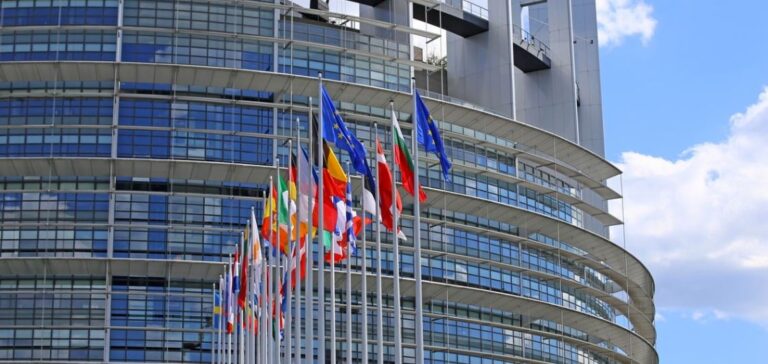Remove the free “rights to pollute” from industrialists, charge for emissions from heating and cars, help exporters…
Tough negotiations are underway to finalize a vast reform of the European carbon market without burdening households and businesses.
To cover their CO2 emissions, electricity producers and energy-intensive industries (steel, cement, etc.) in the EU must now buy “pollution permits” on the European Union Emissions Trading Scheme (ETS), which was created in 2005 and applies to 40% of the continent’s emissions.
The multi-pronged reform proposed in July 2021 by the European Commission, at the heart of its climate plan, aims to accelerate the reduction of proposed quotas, but above all to expand the system across the board.
Negotiators from the European Parliament and EU member states have already finalized the extension of the carbon market to maritime transport and the end of free allowances for airlines.
They also adopted on Tuesday a “carbon tax” at the borders of Europe, to make certain industrial imports (steel, aluminum, cement, fertilizer, electricity, hydrogen) pay for the emissions linked to their production, starting in 2026 or 2027.
But there are crucial points that could derail the final round of talks.
“Fuel and heating”
This is the most controversial point: the Commission proposed to create a second carbon market (ETS2) for heating buildings and fuel for cars and trucks.
Suppliers of heating oil and fuels should buy allowances to cover their CO2 emissions.
Frightened by the social impact of the extra cost for households, MEPs propose to limit the mechanism to office buildings and heavy goods vehicles from 2025.
But the states, beneficiaries of the expected revenues, support the initial project and want to apply it to individuals as early as 2026 or 2027.
No compromise has emerged, although MEPs could consider extending the scheme to households under strict conditions: a cap on the price of CO2, an “emergency brake” for periods of soaring hydrocarbon prices, and entry into force after 2028. But getting a majority in Parliament will be complex.
In the event of a deadlock, the matter could be postponed to 2023.
Social Fund
To support vulnerable households and companies, Brussels is proposing a “social fund” fed by the revenues from the “fuel and heating” carbon market.
Paralyzed by their divisions over ETS2, MEPs and Member States are at odds over the timing of the fund’s launch, the source of funding and the overall budget.
An ETS2 extending to households “would only be acceptable with real compensation: a reinforced social fund launched in 2024,” insists Green MEP Michael Bloss.
Free quotas
As the “carbon tax” at the borders is ramped up, the EU will gradually phase out the free emission allowances that have been allocated to European manufacturers to enable them to compete outside Europe.
The equivalent of 98.5 billion euros was distributed to them between 2013 and 2021, according to WWF.
Their removal is crucial: by treating imports and local production equally, Brussels believes it is staying within the rules of the World Trade Organization (WTO) and countering accusations of protectionism.
But the pace at which free quotas will be phased out is still hotly debated.
The states want a very gradual phase-out between 2026 and 2035.
MEPs want to start in 2027, but very carefully to ensure that the border mechanism works, and then slash 50% of free allowances in 2030, before they disappear completely in 2032.
Export aids
MEPs want European industrial sites to continue to receive free allowances for their production destined for export to non-EU countries without comparable carbon pricing, and in return for investments to decarbonize.
Conditions that would make this support compatible with the WTO, they believe, while the States remain hostile to any “export rebate”.
“We have no mechanism to ensure that a company that invests in decarbonization is not disadvantaged on the global market,” argues Pascal Canfin, chairman of the Parliament’s Environment Committee.
According to several parliamentary sources, soaring energy prices and the massive subsidy plan in the United States, which are undermining the competitiveness of European companies, could lead governments to change their position and accept the principle of support for exporters, even if “it seems technically impossible to find the magic formula this weekend.






















